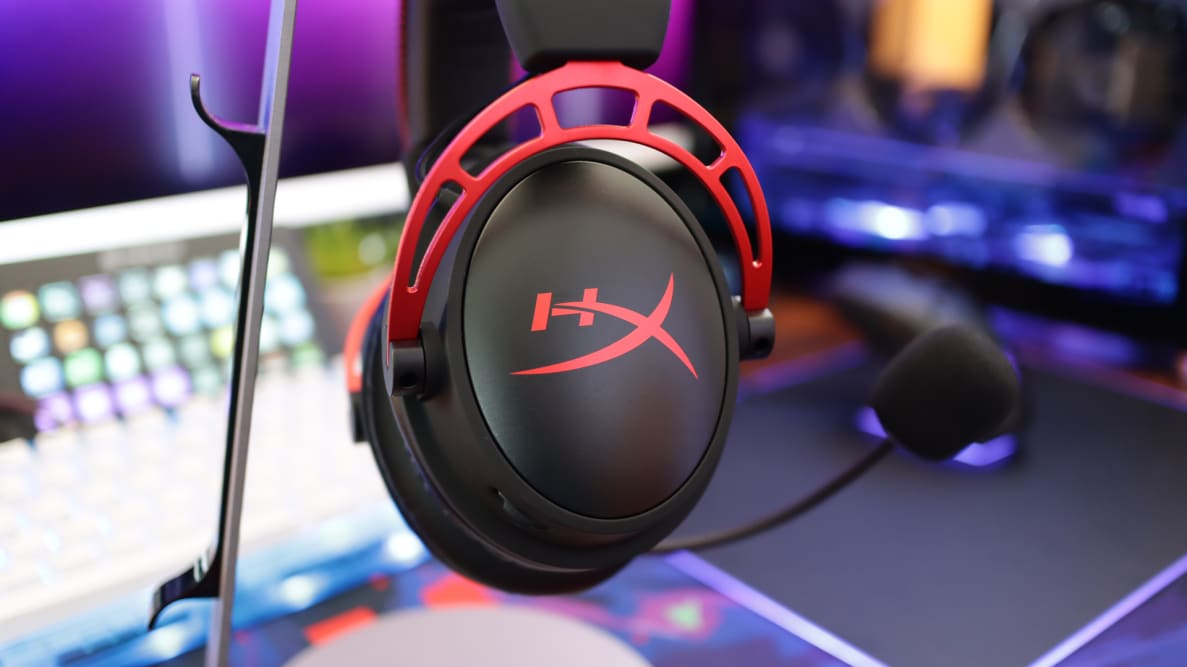Pros
-
Outstanding battery life
-
Big, detailed sound
-
Supports PC and Playstation 5
Cons
-
No Bluetooth support
-
No wired connectivity
The Cloud Alpha Wireless is the third entry in HyperX’s Cloud Alpha line of gaming headsets. The original debuted in 2017 and was widely acclaimed, including by me, for its exceptional audio quality, driven by its dual-chamber driver system. In 2019, the company added surround sound to the mix with the Cloud Alpha S, and proceeded to re-release both in multiple new colors ever since. Though HyperX is no stranger to wireless audio, the Cloud Alpha Wireless is the first in the series that has earned its wings and learned to fly.
The appeal of the Cloud Alpha line has historically lain with its stellar balance of great audio quality, comfort, and clear comms. The wireless model carries all of these traits through, including the dual-chamber audio system, which separates the bass from the midrange and treble to enhance clarity, and its propensity for trapping heat but otherwise being comfortable to wear across gaming sessions. Wireless battery life is easily the star of the show with up to 300 hours per charge.
There’s no other headset that comes close, so if you dread running dry in the middle of a match, this is the best choice available right now. Its 2.4GHz dongle also allows it to be cross-compatible between PC and PlayStation 5, easily allowing you to swap platforms to suit your mood. With that flexibility in mind, it’s all the more surprising that the headset doesn’t support Bluetooth or analog audio, so PC and PlayStation 5 are all you’ll be able to swap to.
About the HyperX Cloud Alpha Wireless
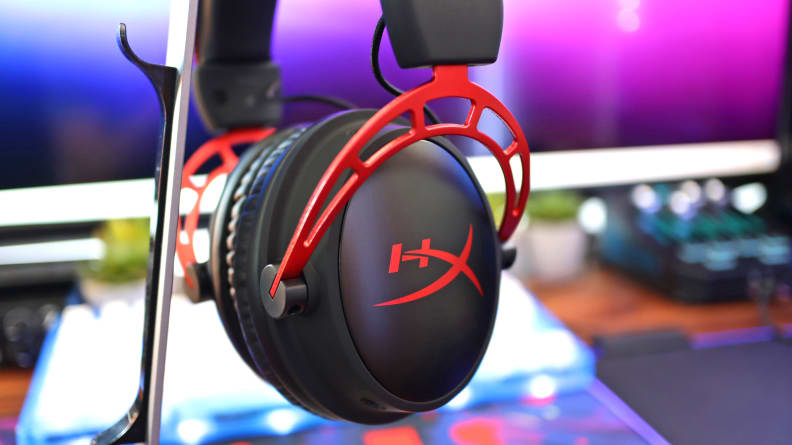
Here’s a quick rundown of the headset’s main specs:
- Cost: $199
- Style: Over-ear
- Colors: Black with red accents
- Drivers: 50mm dual-chamber dynamic drivers
- Wireless connection: 2.4GHz wireless
- Wired connection: N/A
- Device compatibility: PC, PlayStation 5
- Microphone: Detachable boom
- Battery Life: Up to 300 hours
- Virtual Surround Sound: DTS Headphone:X Spatial Audio
- Weight: 335g
The Cloud Alpha line has always been well-made and stylish with that special kind of gamer-chic. The Cloud Alpha Wireless is no exception. It features a classic red and black colorway: black making up most of the headset with red accents in the stitching and aluminum headband. It’s robustly built with the effective use of durable plastics and metal in the band and outer ear cups for added durability. You can’t rotate the cups to lay flat around your neck, which is a shame, but they do tilt to create a better seal and block out surrounding noise.
The shift to wireless demands onboard controls, and HyperX has an efficient arrangement that’s easy to decipher. On the back of the left ear cup are buttons for power and microphone mute. Tapping the mic button mutes it while holding it turns on a live monitor, so you can hear your voice inside the headset. It’s a neat touch. On the right earcup is a volume roller with notches that let you feel each step. Each of the controls has different surfaces, too, so they’re easy to tell apart by touch, saving you from taking the headset off to see which control is where. It’s a well-thought-out package that’s easy to use and shows clear lessons learned from HyperX’s years of making other wireless headsets.
What We Like
Recharges are few and far between
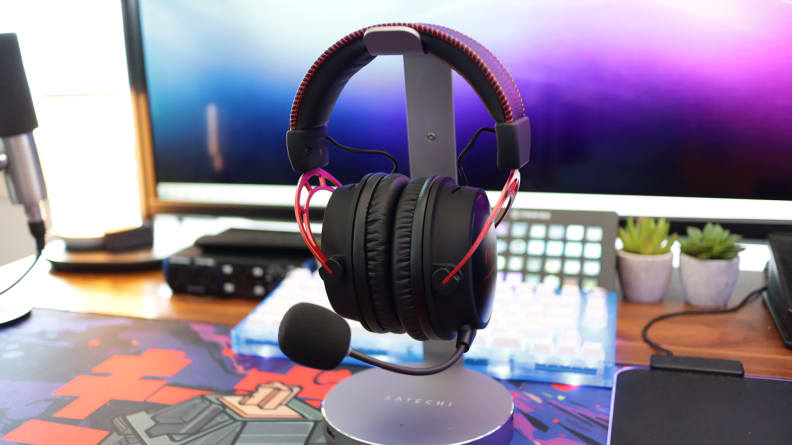
The Cloud Alpha Wireless’s standout feature is its incredible battery life. At 300 hours, it’s not just the longest-lasting gaming headset, it’s one of the longest-lasting wireless headphones period. That extensive battery life means you could play non-stop for just shy of two weeks before needing to recharge. At twelve hours a day, that’s roughly 25 days of gaming. At a “meager” three hours a day, you’ll only need to recharge once every three months or so.
That “or so” is important, because, like most tech companies, HyperX quotes its most optimistic figures, based on listening at 50% volume. While that was usually loud enough for me, you can expect the battery life to decline the louder you listen. Even with that caveat, the Cloud Alpha Wireless could drop a full 100 hours and still be twice the length of its nearest competitor, the GSP 370 from Epos Audio, rated at 100 hours. Others in this space, like the Steelseries Arctis 9 Wireless or the Audeze Penrose will only net you 15 to 20 hours in comparison.
I spent about two weeks with the headset using it anywhere from 1-3 hours a day, and the battery level only dropped about 25%. You can monitor the exact battery level inside the NGenuity software, but a voice prompt will also advise you on your remaining life whenever it turns on. There’s also a colored LED indicator on the left ear cup that changes to indicate the amount of battery remaining. My only gripe here is that the voice prompt only goes in 10% increments, and leans toward the higher figure no matter how much is left between.
In practice, this kind of battery life means that the HyperX Cloud Alpha Wireless is essentially always ready to go and isn’t likely to die out in the middle of a match. If it does, it can also be used while charging, but you’ll need to source your own USB cable since the one included is less than two feet long. But with this much battery life, it should rarely be an issue.
It could give lessons on wireless sound quality
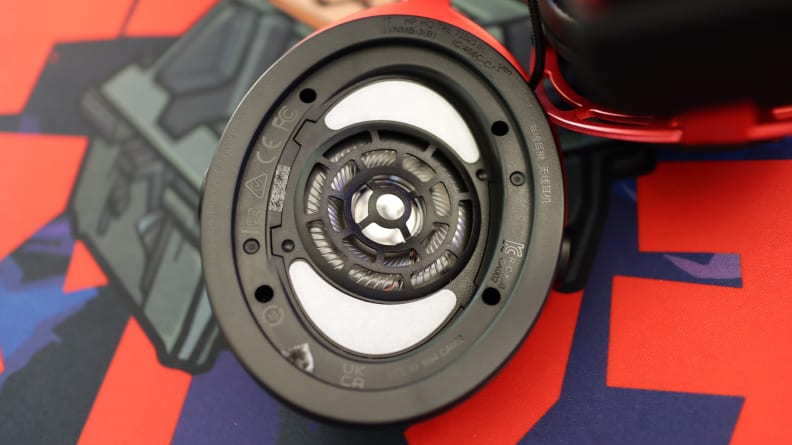
One of the biggest reasons the HyperX Cloud Alpha line has been so popular is because of its impressive sound. The Cloud Alpha Wireless translates this enjoyable quality of the original wonderfully over the air with virtually no loss. The sound is big, crisp, and detailed, just like we’ve come to expect. Its balance between registers makes it a good all-arounder for gaming, music, and movies.
That doesn’t mean it’s light on bass or cinematic impact. Quite the contrary: it offers a full low-end that can deliver a great sense of impact. The bass doesn’t overwhelm the other frequencies thanks to its innovative dual-chamber driver system. Inside each cup, the bass frequencies are physically separated from the mids and highs, helping to ensure that they each come through clearly without any muddiness.
The Cloud Alpha Wireless could give lessons to other gaming headsets on balanced sound quality, especially over wireless. Unlike many gaming headsets that over-emphasize bass, the Cloud Alpha delivers all the punchy impact for big explosions and sweeping soundtracks you could ask for, while also allowing you to pick out tiny details, like the tinkling of breaking glass or enemy footsteps coming around the corner.

Where the Cloud Alpha falls a bit short is the width of its soundstage. The default sound isn’t very spacious and really requires virtual surround sound to create that wider sense of space necessary for immersive gaming. Helpfully, HyperX’s NGenuity software includes DTS Headphone:X Spatial Audio to deliver a virtual surround sound experience. DTS Headphone:X has come a long way over the years and is an effective solution, but I still find that it adds a bit too much reverb to the listening experience outside of gaming. For a more well-rounded spatial experience, it’s well worth investing in a Dolby Atmos license for your PC, which works great for gaming as well as movies and music.
The app also supports multiple EQ presets and the ability to create your own with a full 10-band equalizer. I wasn’t a fan of the different presets that were built-in, but it’s nice to have ready-made options to pull even more bass from these headphones or to accentuate footsteps and other audio cues in games. The default tuning is very well done, however, so don’t be surprised if these particular settings gather virtual dust.
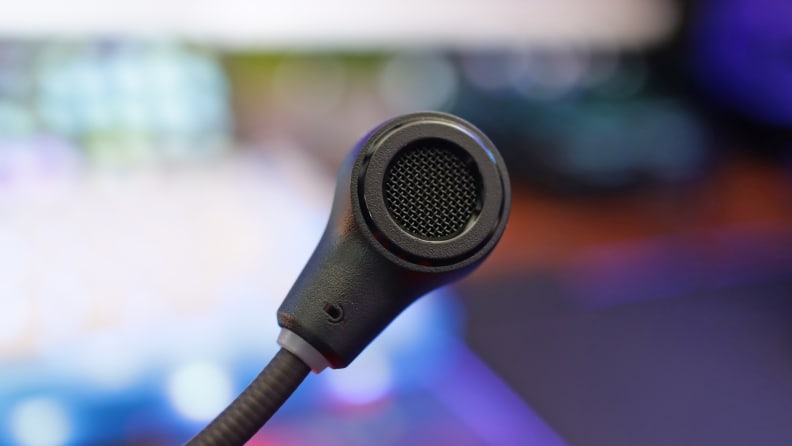
The other element to sound quality worth calling out is the microphone. Testing the wired Cloud Alpha and the Cloud Alpha Wireless side by side, I was impressed by the nearly identical sound of the microphones. It’s not uncommon that microphone quality drops with the shift to wireless as audio signals require more compression to be sent over the air, but HyperX did a great job of maintaining the natural sound of the microphone. The Cloud Alpha Wireless isn’t the best wireless microphone you’ll find — I’ve still yet to hear a wireless microphone that sounds better than the Audio-Technica ATH-G1WL Wireless Gaming Headset — but has more body and less of the nasally digital compression common to wireless gaming headsets.
It works seamlessly with PlayStation 5
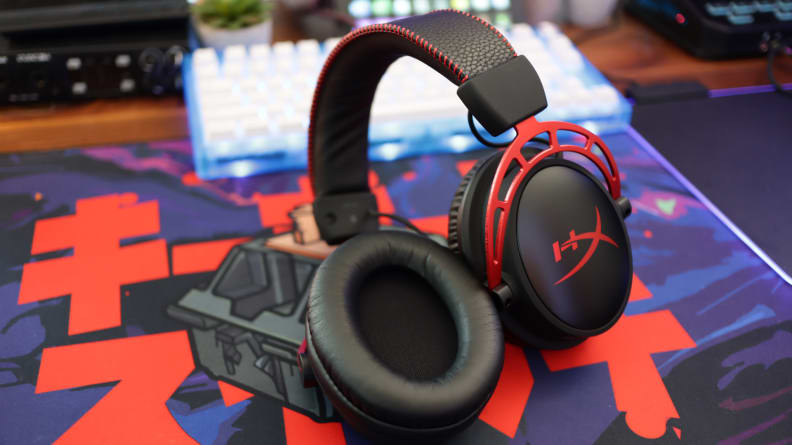
If the HyperX Cloud Alpha Wireless were limited to PC only, the current price might be a bridge too far. Thankfully, it also features native support for PlayStation 5 using the wireless dongle. With only a tiny USB stick to carry between, swapping platforms is quick and easy. My PS5 recognized the headset right away and listed it as an available option in the settings menu. Once selected, it began working immediately and offered a stable, consistent connection without any dropouts.
Multi-platform connectivity is becoming a major selling point for gaming peripherals, so including this was almost a must-have feature, particularly at its current price point. The fact that the headset doesn’t offer connectivity with other platforms, such as the Xbox Series Xor Nintendo Switch, is a major limitation, however, and well worth keeping in mind if you’re looking for a headset that can jump between different consoles. More on that later.
What We Don’t Like
It’s seriously expensive and lacks extras for the investment
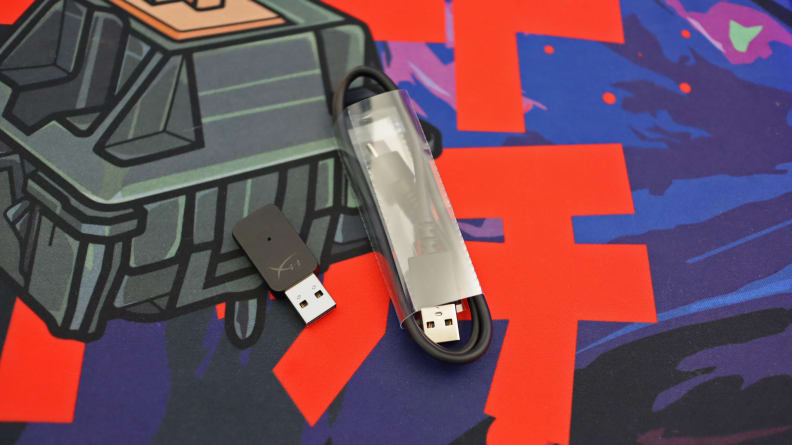
There’s no way around it, at $199 the Cloud Alpha Wireless is expensive, and only feels more so when you compare it to the many alternatives linked throughout this article and in our best gaming headsets list. Competitors are frequently less expensive, and if you’re willing to trade-off that extended battery life, often offer more features for the money.
A travel bag or case would have been a welcome addition, for example, especially for gamers who may want to take their headset to and from school. Alternative pads to trade sound isolation for breathability would have been another great option. As it stands, that $199 goes purely toward the headset, its battery, a dongle, and a charging cable.
Where are the connectivity options?
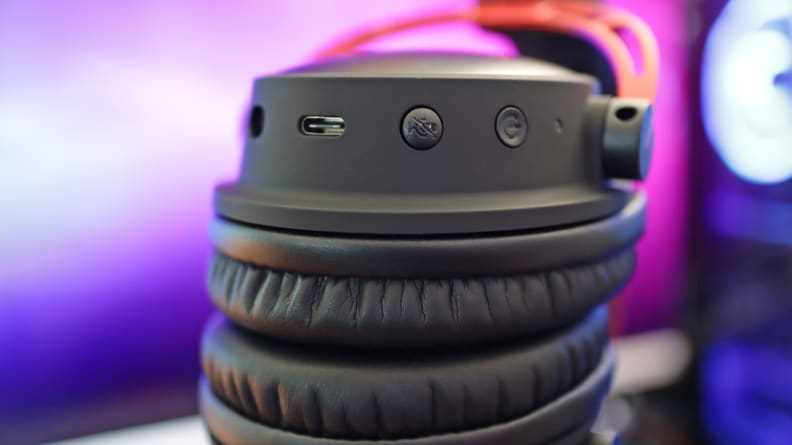
When the headset first arrived, I thought for sure I was missing something: how do you put it into pairing mode for Bluetooth audio? As it turns out, I didn’t miss anything. Unlike its biggest competitors, Cloud Alpha Wireless doesn’t support Bluetooth at all, completely ruling out being able to take a call with the same headset you’re gaming on. That’s a killer feature found on the Steelseries Arctis 9 and a big omission for HyperX.
Bluetooth would come in handy for more than just taking calls, too. The headset sounds great for music, as well as games. It would be a perfectly fine choice for listening to Spotify around the house or, if you can get past the red accents, taking on the go as a normal pair of Bluetooth headphones. It even sports a detachable microphone to better fit the look, but that’s just not possible here.
Worse, the headset also lacks support for analog audio. There’s no way to plug in a normal 3.5mm cable and connect to your Nintendo Switch or Xbox controller. The limited connectivity really puts it at a disadvantage to other wireless headsets at this price. I would love to have used it with my Xbox, even with a wire, but you’re stuck needing a whole second headset.
Adding these features would likely have driven the price up. Since, it’s so similar to the standard HyperX Cloud Alpha, (only $95 as of this writing), it seems clear that most of what you’re paying for is the 2.4GHz wireless connection and the large battery. I would much rather have seen battery life come in at 200 or even 150 hours and include these features instead.
This headset runs hot
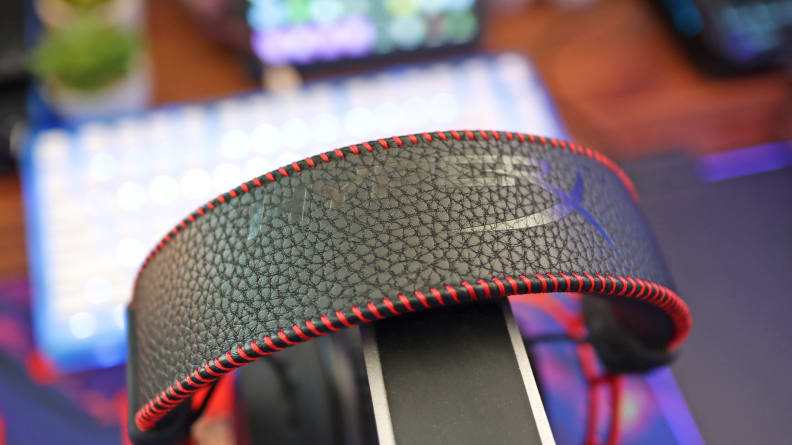
The Cloud Alpha Wireless is relatively lightweight and comfortable to wear. It distributes its 335-gram weight well and doesn’t create sore spots on the top of your head. Better still, if you’re a glasses wearer, the ear cushions are soft enough that they don’t drive the arms into your head and cause pain above your ears. In a lot of ways, the headset is exceptionally comfortable.
It just gets hot. The included pads are made of memory foam and are trimmed with faux leather. These fabrics do a good job of isolating sound and improving bass response, but they do an even better job of trapping and storing heat. It didn’t take long before my ears began to feel hot, even in a reasonably cool room. On several of the warmer days since, I’ve needed breaks to vent heat build-up every 20 to 30 minutes. I’m not prone to ear sweating, but I have no doubt that the Cloud Alpha Wireless will make me sweat during the summer months. It’s just not very breathable.
If you’re sensitive to heat build-up, this headset may not be for you.
Should You Buy It?
Maybe, if you don’t mind paying extra for battery life and only plan to play on PC or PS5

The Cloud Alpha Wireless is a great gaming headset, but it’s not a perfect one and you pay a hefty premium for that extended battery life. One of the things that most stood out in my testing is just how similar it was to the original Cloud Alpha, for better and worse. It features the same great sound quality and high-quality microphone—all the more impressive with the lack of a physical wire making an analog connection. Likewise, while I’d never suggest dropping a $199 headset, this is clearly the kind of peripheral you could leave out on a desk without fear of it breaking with the odd bump.
On the other hand, it’s also inherited some of the drawbacks of the original. The lack of alternate cushions or a travel bag is disappointing, but what’s worse is the lack of connectivity options. For $199, it needs Bluetooth to compete with competitors like the Steelseries Arctis 9 Wireless or Epos Sennheiser GSP 670. There isn’t even a way to connect with a standard 3.5mm audio cable, which means you can’t use it with your Xbox or Nintendo Switch either. It’s a bit sparse for such a high price. If you game on PC or PS5, this won’t be an issue, but it will still leave you in need of a second headset if you also play on other platforms.
Still, the Cloud Alpha Wireless gets the most important qualities right: it sounds great, offers solid comms, is reasonably comfortable, and lasts a ridiculously long time between recharges. That battery life certainly seems to be the biggest reason why the headset is so expensive, but it’s a good one and goes a long way toward solving the single biggest issue facing wireless gaming headsets: unexpected dead batteries.
Like the original Cloud Alpha, the Cloud Alpha Wireless is a winner. It doesn’t come cheap, but it’s a worthy choice for PC and PS5 gamers who don’t mind missing out on Bluetooth connectivity.
Meet the tester
Chris has been specializing in PC and audio-related tech since 2015. Find him at IGN, Tom's Hardware, PC Perspective, MMORPG.com, and more.
Checking our work.
Our team is here to help you buy the best stuff and love what you own. Our writers, editors, and experts obsess over the products we cover to make sure you're confident and satisfied. Have a different opinion about something we recommend? Email us and we'll compare notes.
Shoot us an email